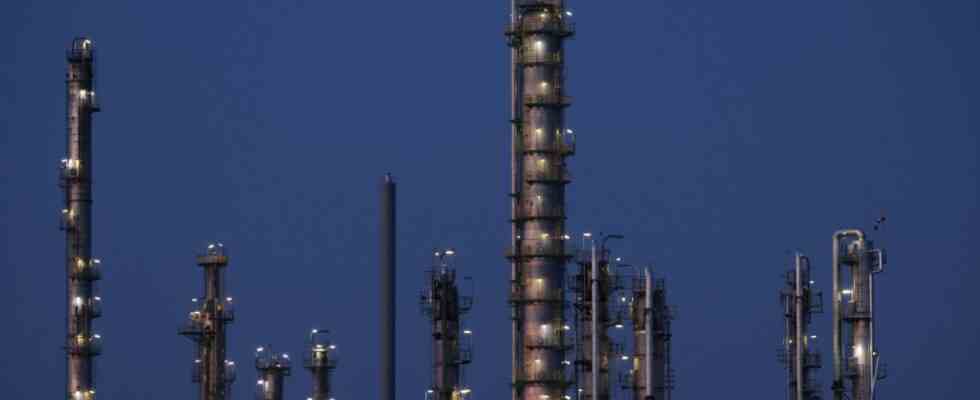The people at PCK have experience with state sovereignty. After all, the abbreviation stood for “Petrochemical Combine”. In GDR times, 8,000 people found work here in Schwedt, Brandenburg. Today PCK stands for “Petrolchemie und Kraftwerke AG”. And since this Friday the state has been at the helm again – this time in the form of the Federal Network Agency in Bonn.
The federal government has pulled the ripcord: With immediate effect, the Bonn authority is taking over all voting rights of the previous majority owner of PCK, the Russian Rosneft group. As with the German subsidiary of the Gazprom group, the network agency will thus become a trustee: the companies will not be expropriated, they just have nothing more to say. Rosneft Germany also has to bear the costs of the trust administration. Profits flow into a trust account or are invested in the company.
“Russia is no longer a reliable energy supplier, as the past few weeks have shown,” said Chancellor Olaf Scholz (SPD) on Friday. The federal government did not take the decision lightly, “but it was unavoidable”. After all, it is now a question of ensuring the survival of the site. Employees there no longer have to worry about their personal future. “The impasse is over,” said the Chancellor.
In fact, there was a constant risk that Russia would stop supplying oil overnight after supplying gas. Germany would have been hit hard: According to figures from the Ministry of Economic Affairs, Russian imports accounted for around 30 percent of local oil consumption in June. In addition, the end of the deliveries is due in a good three months at the latest. At an EU summit in May, Scholz had promised to end imports by the end of the year – together with Poland in a protocol statement. At the time, the EU countries could not agree on an embargo for Russian pipeline oil. Hungary, the Czech Republic and Slovakia opposed it. But the East German refineries Schwedt and Leuna will have to stock up elsewhere in the foreseeable future.
If Schwedt should no longer deliver, things could get tight in some places
A wall mosaic in the canteen of the refinery bears witness to the turning point in the history of Schwedt in particular. Laboratories and smoking chimneys can be seen there, workers shaking hands. And then engineers and construction workers, they plan a tube between the socialist brother states: Druzhba, “Friendship”. On the mosaic it begins at drilling towers near present-day Samara and ends in Schwedt. That’s how it went for more than 50 years. The Druzhba delivered crude oil, and in Schwedt diesel and petrol were made from it. First for the GDR, later for Berlin and Brandenburg. If Schwedt no longer delivers, things will get tight around the capital and its airport.
So other oil is needed so that the refinery can at least continue to operate at minimum. That could be done via the port of Rostock, which is connected to Schwedt by pipeline. However, this is not enough for the refinery to operate economically. “Immediate upgrading of the Rostock-Schwedt pipeline is necessary,” said Patrick Graichen, Secretary of State for Energy, in response to a small question from the Union faction. So-called flow improvers could help, but above all additional pumping stations would be needed – construction time: “two to three years”. There are also plans to channel Kazakh oil to Schwedt; and, moreover, talks with Poland to bring in more oil through the port of Danzig. It now also supplies the other East German refinery, in Leuna near Bitterfeld.
Poland, on the other hand, has had reservations about delivering oil from Gdansk to Schwedt – to a refinery in mostly Russian hands. This puts the neighbor in the circle of those who had a problem with the Russian ownership. Although Rosneft only holds a good 54 percent of PCK, the other 37 percent are owned by the Shell group. “The uncertainties existing in the market about the treatment of Rosneft Germany under sanctions law” have led to numerous contractual partners having turned away from the group, according to the trustee order of the Ministry of Economic Affairs – and not only in Schwedt, but also in the Rosneft shares in the Bayernoil refinery in Vohburg and the mineral oil refinery Oberrhein in Karlsruhe. The federal government is now also taking over these holdings in trust; in all cases initially for the next six months.
If the worst comes to the worst, the refiners should be taken care of
And what if Rosneft, for its part, stops supplying oil? “We have prepared well,” says Federal Minister of Economics Robert Habeck (Greens). The oil depots in Schwedt and Leuna have been filled again, and the national oil reserve is maintained. A hundred million euros would now be made available to bring the infrastructure into shape. Habeck was in Schwedt twice himself, and on the second visit he was met with anger from the refiners there. The talks there, he now says, “deeply impressed and shaped him.”
A total of 750 million euros are now also to flow into the affected regions in eastern Germany, partly from the federal government, partly from the states. A start-up laboratory is to be set up in Schwedt, and the refinery is also to start producing synthetic, climate-friendly fuels. If you still run out of work, you will receive short-time work benefits. The refinery, says Brandenburg’s Prime Minister Dietmar Woidke (SPD), is the “heart and backbone” of the region. “You really only understand that if you flash back to the 90s.” At that time, many structures that were previously believed to be safe broke away – structures from times when the state had the upper hand. “The sensitivity in the Uckermark,” says Woidke, “is different than in the Berlin area or parts of West Germany.”

